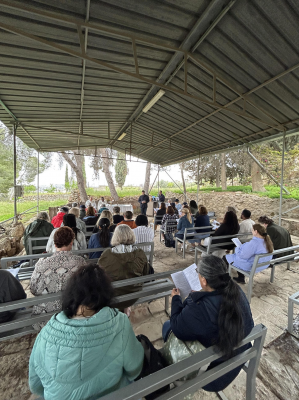Holy Land Homily: Shepherds Fields, Bethlehem

Mass at Shepherd's Fields - ICN/JS
Deacon Patrick van der Vorst gave the following homily today, 11 April 2023, at Shepherds Fields, Bethlehem, on the first day of our pilgrimage to the Holy Land.
Isaiah 9:1
Luke 2:1-14
The Gospel reading ends with those glorious words that we say each Sunday during Mass:
Glory to God in the Highest, Gloria in excelsis deo!
This is probably one of the most widespread sentences that has been used throughout our Liturgies and our music in our 2000 year history as a church…
The Gospel of Luke tells us that these words were sung by the angels as they appeared to the shepherds. And where did all this happen? Right here! The Angelic announcement of Christ's birth happened exactly in these fields.
What a beautiful place to be to start our pilgrimage to the Holy Land.
As we start our trip to the sacred sites where our Lord Jesus Christ lived, worked, ministered, preached, we are the very spot where Salvation history started: the angels announcing that Christ was born.
So what exactly did these angels say?
The very first words they said was: 'do not be afraid'. And we can well imagine the the shepherds would have been terrified to have angels appear to them. But those words, like all words in the Sacred Scripture are also addressed to us. So God's first words, through the intermediary of the angels to us are: 'Do not be afraid'. Why would God's very first words to us when he sent his only son into the world be: 'Do not be afraid'? Because he knows that we ARE afraid. We are afraid to give ourselves fully to him. We always hold back.
- We let God into our lives - partly.
- We let him be in control - sometimes.
- We let God do his work inside us - at times.
- We let him love us - when it suits us.
So here is God telling us at the start of our pilgrimage: Do not be afraid. Just put yourselves fully into his hands…. And all will be ok….
The second thing the angels tell the shepherds is: 'You will find a baby wrapped in swaddling clothes and lying in a manger'. In that small, short sentence we find the whole of our salvation history. Because on the one hand the swaddling clothes and the manger are indeed the instruments we associate with the birth of Christ… BUT ….. BUT these also foretell already the death of Christ too: the swaddling clothes foretell that one day Jesus will be wrapped in linens inside the tomb; the wood of the manger foretells the wood of the cross…
The beauty with Scripture is that nothing is left to chance. Luke when he wrote today's Gospel knew what he was doing. Luke wrote his Gospel around 80-85AD, so some 50 years after Christ died. So he knew very well that the birth of Christ would lead up to his death and Resurrection. So as a good writer does, he sows and scatters seeds throughout his Gospel telling us about what is to come later in his Gospel… And tomorrow's mass we will celebrate at the Domains Flevit Church where Jesus wept just before his Passion…
Today we find ourselves at the beginning of Christ's life; tomorrow at the very end of his life.
Sarah made this very beautiful mass booklet to accompany us during this trip. I would encourage you to use this booklet not just to follow the readings when we have mass, but look at it from time to time during the day too and let the readings sit with you and penetrate your soul.
…and so also look closely at today's first reading. It is a wonderful reading to meditate upon.
The prophet Isaiah tells us that a child will be born for us and his light will shine into the world. But as we find ourselves here in the agricultural setting of Shepherds' Fields, the stand out image Isiah uses is maybe that of a 'yoke'. This tells us exactly why the Messiah would come into our world. Most of Isaiah's listeners at the time (about 800 years before Christ) were involved in farming or fishing, so the image of a yoke must have appealed to them; probably less so today, in our age of industrialised agriculture. Nevertheless, it is easy enough to work with this image. A yoke keeps two oxen together as they plow the fields, to prepare for a new season of crop planting.
And with a yoke, the two oxen have to work together. The stronger ox leads the weaker ox, working their way through the fields and life, ploughing one row at a time, towards completing their task. And that is why Jesus came into the world: to help us carry our yoke, our worries, our burdens, so that together Him and you, can plough the fields of your lives, working towards a great harvest together.
The farmers in these fields around us would have used yokes. And these poor farmers and shepherds are exactly the people to whom God announced the greatest event in the history of our world. When we deal with the poor we may send come money or compassion; when God deals with the poor, he sends them angels!… angels singing Gloria in excelsis Deo!
…and so from this very place, 2023 year ago, the shepherds went on their way to find baby Jesus in the manger in Bethlehem… our next stop after this mass, the Nativity Church of Bethlehem.


















